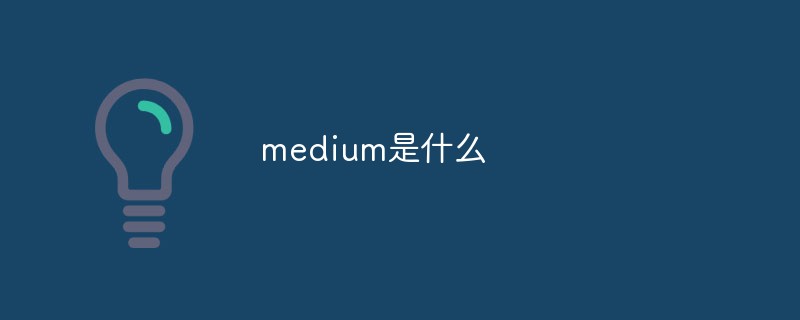medium是一个轻量级内容发行的平台,允许单一用户或多人协作,将自己创作的内容以主题的形式结集为专辑“Collection”,分享给用户进行消费和阅读。

medium是什么?
Medium 是一个轻量级内容发行的平台,允许单一用户或多人协作,将自己创作的内容以主题的形式结集为专辑(Collection),分享给用户进行消费和阅读。
Medium强调用视觉化的图文样式提高用户的阅读体验、用主题为核心的内容组织方式来聚合内容、用用户投票的众包形式进一步精选内容、用精美的网站模版来加强页面的结构化。对 Medium 这样的新的内容发行形式来说,作者、品牌不是最重要的,话题才是核心。Medium 不希望用户仅仅因为某篇文章是某个作者所写就去阅读,而希望他们阅读的理由是因为该文章的话题是其真正关注的。
相信大多数人都同意,普遍流行的以时间线倒序、实时更新的信息流对于内容的沉淀来说并不是最好的形式。这一问题从博客诞生之初就开始存在,当博客更新还不算频繁的时候,这个问题还不明显,但只要看看许多人的 RSS Reader 里常年超过上千条的更新,我们就可以意识到这个问题的严重性。微博曾经被认为通过好友的社会化过滤攻克了这个问题,但我们慢慢发现,微博实时的时间线只是将这个问题隐藏了起来,但根本上的内容组织方式并无区别。而人们心理上对于“新”的天生兴奋度带来的对新鲜度、眼球的不懈追求,对内容创造者来说产生了巨大的“更新”压力,也让互联网内容的总体质量受到了不良的影响。
内容发行需要变革,这点是确定的,但 Medium 们是否就是答案呢?看来还远非明朗。它们对品牌的弱化这一思路显得比较理想化,但对于人们为何需要在其平台上进行内容发行尚缺乏足够的激励,已有成熟渠道的品牌是否愿意接受?而资源有限、习惯了非常随意的社交媒体风格的普通用户又是否会利用这种略显正式的发行模式?内容如何为创作者带来实体价值也尚无明显途径,这类平台上普遍存在的精英主义思潮并不能保证其一定能够成功。当然,我们值得期待这些在品牌、算法之外的,对于内容组织和探索的更多的尝试。
更多相关知识,请访问PHP中文网!
 PHP Performance Tuning for High Traffic WebsitesMay 14, 2025 am 12:13 AM
PHP Performance Tuning for High Traffic WebsitesMay 14, 2025 am 12:13 AMThesecrettokeepingaPHP-poweredwebsiterunningsmoothlyunderheavyloadinvolvesseveralkeystrategies:1)ImplementopcodecachingwithOPcachetoreducescriptexecutiontime,2)UsedatabasequerycachingwithRedistolessendatabaseload,3)LeverageCDNslikeCloudflareforservin
 Dependency Injection in PHP: Code Examples for BeginnersMay 14, 2025 am 12:08 AM
Dependency Injection in PHP: Code Examples for BeginnersMay 14, 2025 am 12:08 AMYou should care about DependencyInjection(DI) because it makes your code clearer and easier to maintain. 1) DI makes it more modular by decoupling classes, 2) improves the convenience of testing and code flexibility, 3) Use DI containers to manage complex dependencies, but pay attention to performance impact and circular dependencies, 4) The best practice is to rely on abstract interfaces to achieve loose coupling.
 PHP Performance: is it possible to optimize the application?May 14, 2025 am 12:04 AM
PHP Performance: is it possible to optimize the application?May 14, 2025 am 12:04 AMYes,optimizingaPHPapplicationispossibleandessential.1)ImplementcachingusingAPCutoreducedatabaseload.2)Optimizedatabaseswithindexing,efficientqueries,andconnectionpooling.3)Enhancecodewithbuilt-infunctions,avoidingglobalvariables,andusingopcodecaching
 PHP Performance Optimization: The Ultimate GuideMay 14, 2025 am 12:02 AM
PHP Performance Optimization: The Ultimate GuideMay 14, 2025 am 12:02 AMThekeystrategiestosignificantlyboostPHPapplicationperformanceare:1)UseopcodecachinglikeOPcachetoreduceexecutiontime,2)Optimizedatabaseinteractionswithpreparedstatementsandproperindexing,3)ConfigurewebserverslikeNginxwithPHP-FPMforbetterperformance,4)
 PHP Dependency Injection Container: A Quick StartMay 13, 2025 am 12:11 AM
PHP Dependency Injection Container: A Quick StartMay 13, 2025 am 12:11 AMAPHPDependencyInjectionContainerisatoolthatmanagesclassdependencies,enhancingcodemodularity,testability,andmaintainability.Itactsasacentralhubforcreatingandinjectingdependencies,thusreducingtightcouplingandeasingunittesting.
 Dependency Injection vs. Service Locator in PHPMay 13, 2025 am 12:10 AM
Dependency Injection vs. Service Locator in PHPMay 13, 2025 am 12:10 AMSelect DependencyInjection (DI) for large applications, ServiceLocator is suitable for small projects or prototypes. 1) DI improves the testability and modularity of the code through constructor injection. 2) ServiceLocator obtains services through center registration, which is convenient but may lead to an increase in code coupling.
 PHP performance optimization strategies.May 13, 2025 am 12:06 AM
PHP performance optimization strategies.May 13, 2025 am 12:06 AMPHPapplicationscanbeoptimizedforspeedandefficiencyby:1)enablingopcacheinphp.ini,2)usingpreparedstatementswithPDOfordatabasequeries,3)replacingloopswitharray_filterandarray_mapfordataprocessing,4)configuringNginxasareverseproxy,5)implementingcachingwi
 PHP Email Validation: Ensuring Emails Are Sent CorrectlyMay 13, 2025 am 12:06 AM
PHP Email Validation: Ensuring Emails Are Sent CorrectlyMay 13, 2025 am 12:06 AMPHPemailvalidationinvolvesthreesteps:1)Formatvalidationusingregularexpressionstochecktheemailformat;2)DNSvalidationtoensurethedomainhasavalidMXrecord;3)SMTPvalidation,themostthoroughmethod,whichchecksifthemailboxexistsbyconnectingtotheSMTPserver.Impl


Hot AI Tools

Undresser.AI Undress
AI-powered app for creating realistic nude photos

AI Clothes Remover
Online AI tool for removing clothes from photos.

Undress AI Tool
Undress images for free

Clothoff.io
AI clothes remover

Video Face Swap
Swap faces in any video effortlessly with our completely free AI face swap tool!

Hot Article

Hot Tools

SublimeText3 Mac version
God-level code editing software (SublimeText3)

MantisBT
Mantis is an easy-to-deploy web-based defect tracking tool designed to aid in product defect tracking. It requires PHP, MySQL and a web server. Check out our demo and hosting services.

Dreamweaver CS6
Visual web development tools

ZendStudio 13.5.1 Mac
Powerful PHP integrated development environment

SublimeText3 Chinese version
Chinese version, very easy to use






